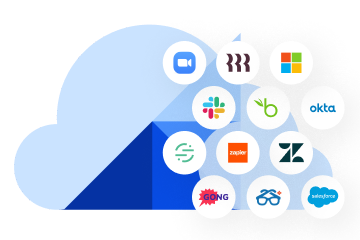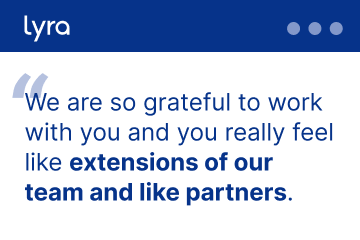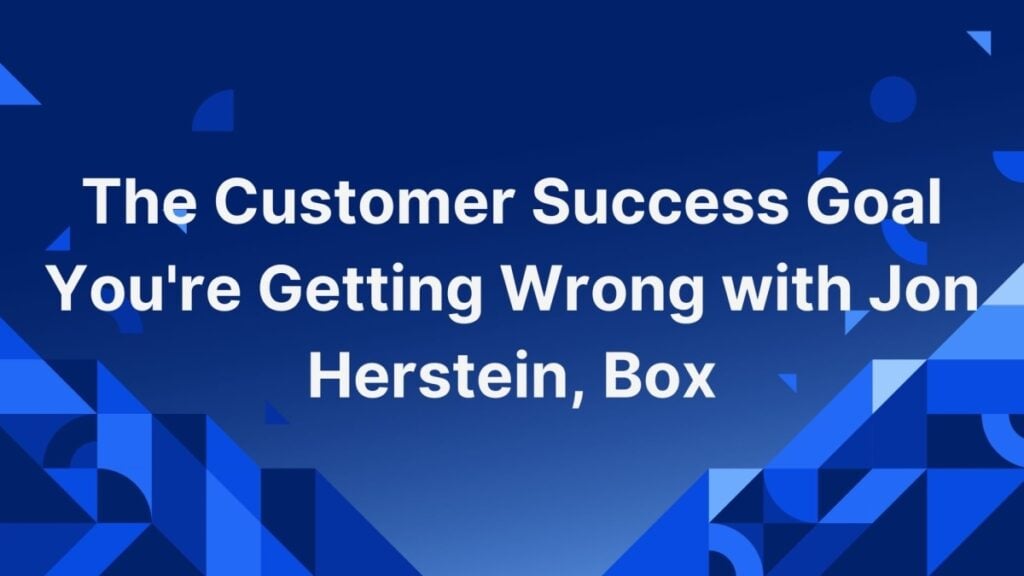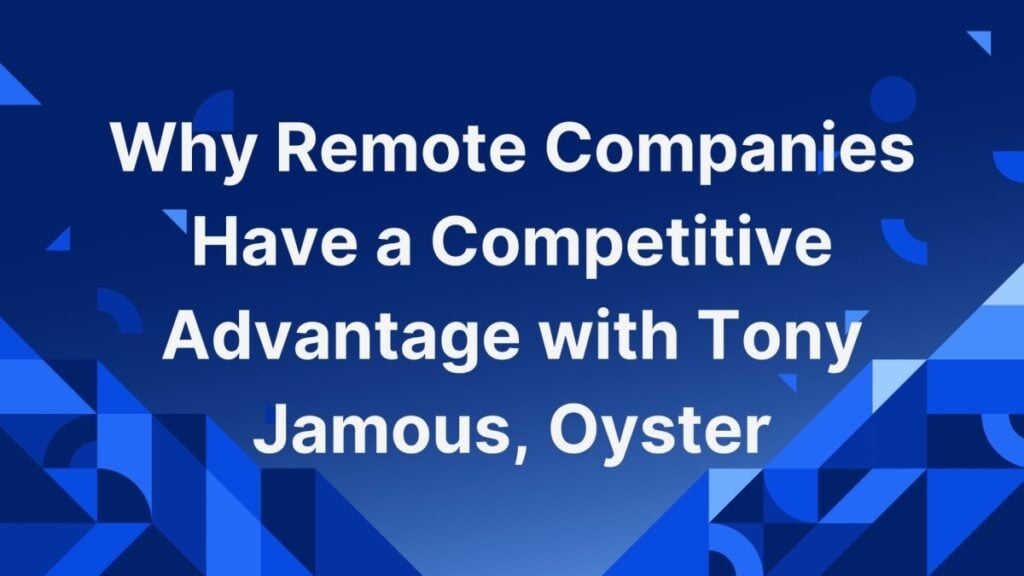-
 Resource Center
Resource Center
Discover enablement best practices and more in our resource center.
-
 Blog
Blog
Read the latest on enablement, learning and training trends.
-
 Podcast
Podcast
LEARN from the top leaders in SaaS.
-
 Videos
Videos
Watch videos and gain actionable insights from leading experts.
Rethinking People Management
with Jack Altman, CEO & Co-Founder of Lattice
People management is more than ticking off the usual HR tasks.
Succeeding as a people manager requires a mastery that encompasses a deeper understanding of interpersonal dynamics, leadership acumen, and the adept handling of the intricate tapestry of human connections.
“I think the mindset flips that I've seen a lot of people go through and that I hope a lot more HR leaders go through is really operating like something close to a COO—something close to somebody who thinks about, ‘How do I build the strongest, most effective company possible from my seat?’” says Jack Altman, CEO and Co-Founder of Lattice.
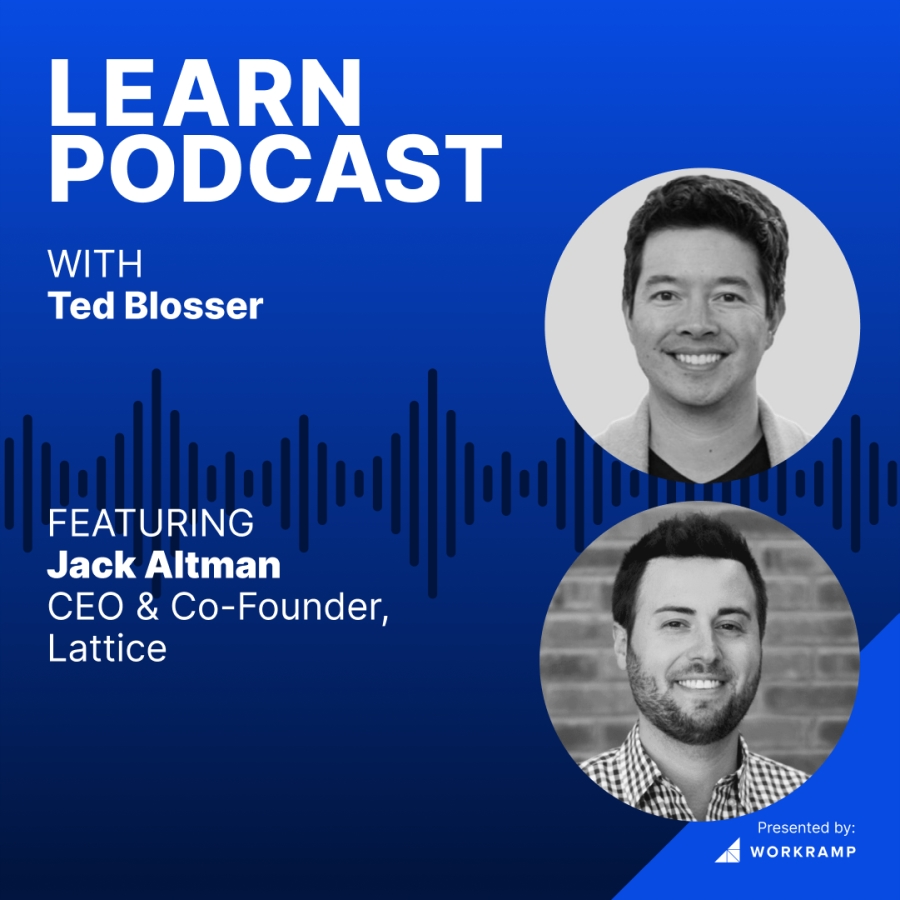
In this episode of LEARN, Jack shares his insights about the state of HR and people management. Listen in to hear a candid conversation about ways to lead teams better and ensure alignment to produce the company’s best work and boost employee satisfaction.
Key takeaways:
- Great managers are chameleons who adapt to their teams
- HR can drive operational excellence by designing and improving processes
- The best way to develop leaders is through experiential learning
Tune in on your favorite podcast app to get a deep dive into the state of people management and how to future-proof your processes.
Timestamps
[03:06] The new role of HR
[05:20] How HR leaders can start thinking like business owners
[07:45] The future of workplace culture
[11:40] Why Glass Door reviews might not be so insightful
[13:25] The future of career growth
[17:55] Screening for the right managers
[19:10] Developing leaders at Lattice
[23:22] LEARN Rapid-fire round
Resources
Transcript
Jack: The best managers are chameleons to their teams. And so the world's most expert manager, who has eight direct reports, will show up unbelievably differently to each of them. And the longer I've been a manager and the longer I've worked with great other managers,
the more I believe that great managers are chameleons and don't do everything the same way
Ted: Hi, I'm Ted Blosser, CEO and co-founder of WorkRamp, where we're redefining the corporate learning space with the world's first all-in-one learning cloud for employee and customer learning. Welcome to the LEARN Podcast, where we learn from the biggest leaders in SaaS and hear what makes them successful.
Hope you enjoy the show. Hey, what's up, everybody. Welcome back to the LEARN Podcast. We have a special guest today, Jack Altman, CEO of Lattice. Welcome, Jack.
Jack: Thanks for having me. I'm excited to be here.
Ted: Jack, you're on the board of WordRamp. I knew you would eventually be on here, so I'm so excited. Could finally get you on here. Well, a lot of people know you, but some of the audience may not know you. So I wanted to see if we could get kicked off with an elevator pitch on both You and also lattice so we can start from the same baseline for everybody.
Jack: Lattice is, a company I started, eight years ago. And, we started in performance management. And so the idea was; basically, we saw that the way people were doing performance management at the time, and what we thought would be most... Valuable to employees and companies were different historically.
The sort of standard had been to do this kind of hierarchical top-down, goal-based rating-based sort of idea. And by the time lattice came around in 2015, 16, we were getting to a place where a lot of HR people were starting to think, are there ways to do this that are going to be more developmental focused, more focused on people's growth, giving feedback, incorporating 360 input. Yeah.
There had been a lot of companies in the preceding five years that had just gotten rid of performance reviews entirely. And that didn't work particularly well either. And so the pendulum swung all the way too far. And so lattice came with something in the middle where we said, let's do something structured, but focused on the employee's interests.
And that will. In fact, it also makes the company best off. And so that was how we got going. And then, over time, we've expanded it out into a bunch of other categories like employee engagement, compensation, management, career management, and most recently in HRIS. And so today our view is basically to build a people-centric version of an HR full platform for the mid-market.
So that's where we are now.
Ted: Can you tell us a little bit about the scale of lattice and even you personally? Was this your first CEO gig? Have you learned the role itself? Give us a little background on yourself on top of that, too.
Jack: Yeah. Today we have about 500 customers, maybe 550 employees. We're headquartered in San Francisco, although, we've got people in New York and London, many people remotely. So we're kind of all over. Yeah, it's the 1st company I've ever, founded, and, you sort of just start a company, and then you just sort of grow into the role. And that's one of the fun things about being a founder and a CEO as the company grows every three months, six months, it's a completely different job. And, as there are new layers in the organization, as there are new sorts of, challenges and, quests to go on as a company, you just, keep reinventing and learning.
And that's like a great joy of, the role.
Ted: I want to ask you that last question because you've had to learn on the job at a company where you are essentially the North Star for all these other companies around people management. So what I wanted to do today was actually go through a series of key areas that, I would say, are challenging for people around people management.
So I love to cover three or four key topics around just people management in general, and your, either hot takes or philosophies. On each of them. So the first area I want to talk about is you penned this post recently around HR driving operational excellence now in this new phase of company growth, both at Lattice and also for other companies to tell us more about what you think the new role is with HR in terms of driving operational excellence of companies.
Jack: Yeah. So I think this is an aspiration for what I think the best HR leaders do and how they think, and what their role can be at a company. Obviously, a company's composed of its product and the people who build it; there are the go-to-market teams that, grow the company and sort of, you know, acquire more customers.
And then there's like the internal infrastructure teams, which you would typically think of as, you know, finance, HR, legal, et cetera. and finance is critically important to make sure that you're spending and investing in the right sorts of ways and that you're budgeting and forecasting properly and that your plans all make sense that you're holding teams accountable to what they said they would do.
Obviously critical. But I think you know, the HR role to me is about designing the product of. Your company, and I think in its highest form, the role that HR can play is to help the company be designed to be as effective as possible and partner closely with the CEO to design that and to make sure that you're staying close to doing this the way that you want?
In which ways are you behind where you need to be? The historical model. Let's take the sort of negative take that people would have on HR. And you imagine like, sort of the worst tropes about what an HR team is doing, where they're just, creating red tape and making rules and adding trainings and like doing things that employees don't want.
That's not how it has to be. And that's not what the greatest HR teams in the world are doing. And I've been really inspired over the last year, talking to a bunch of HR leaders who are. Thinking like business owners, acting and operating that way who are thinking about spans of control and what sort of org designs make sense.
Where are there places where we have costs that are not only. Using money that we shouldn't be spending, but are, in fact, slowing us down and creating inefficiencies. What are the ways where we are, not promoting our top talent or identifying our top talent as quickly and effectively as possible?
What are the places where we're not moving fast or identifying quickly enough to people where it's not working out the way that it needs to be. but I think the mindset flip that I've seen a lot of people go through and that I hope a lot more HR leaders go through is.
Really operating like, something close to a COO, something close to somebody who thinks about how do I build the strongest, most effective company possible from my seat? And I think there's a lot of that going on. It's really cool.
Ted: Actually, I wanna ask a follow-up to that. Do you have any tips on how HR leaders can make that transition, you have any big tips or things that you have even observed in the field or your customer base on people have made that transition really well over the last year.
Jack: yeah, I can talk about a few of the things that I think are maybe like, important ingredients to being able to do it. I think one is. You have to, start from a place of self-awareness and knowing what you don't know and knowing the types of people that you need to expose yourself to to learn those things.
And so if you're an up-and-coming HR leader who is, wanting to adopt this kind of mindset. But you haven't been exposed to, like, really great operational leaders, and you haven't, done this kind of thinking and work yourself, then having the self-awareness, humility to go find mentors, either inside your company or outside your company, who have built great organizations, know what this kind of stuff looks like, and this could be a CRO, This could be a great, VP of engineering who's operated a great scale.
It could be a finance leader. It could be other chief people officers. Always for all of us, but this goes for HR leaders too is starting from a place of humility, identifying where your knowledge or experience gaps are, and then finding ways, to surround yourself with people who have the experience and insights to help with that and that's one. I think another is, I'll say this for HR leaders, but this is also true for founders. It's also true for execs and other departments too. You do have to adopt a willingness to do unpopular things. And so much of what happened through ZIRP became, this crescendo of things getting wilder and wilder.
In a way where we now all can kind of look back at 2021 and be like, whoa, that was, that was really something. But I do think that there became a lot of things that were popularity contests they had to be because the competition for employees was so fierce operating like that.
It was really hard to hold on to people because there were just too many companies with too much money competing too aggressively. And so I do think in today's world, you still, I believe should operate in very employee-minded ways. And the great way to build a valuable, healthy company for the long term is to really invest in and take care of people.
But I think in environments like today, versus in 2021, we all need to be willing to make less popular decisions. And that goes for HR leaders too. And that's not something that, many of us have had to do up until, the downturn of the last 18 months. So I think that's an evolution for a lot of people too.
So those would be a couple of things.
Ted: You made a great point about wanting to be liked. And you're totally right. HR leaders used to get measured on. Hey, how happy were people in an organization? I actually want to shift to this second topic, which is culture and you know, we're obviously happy customers of lattice.
We use the engagement surveys every quarter, and you have this tendency. I even have this tendency I get the engagement survey back. I read the hundreds of comments. I'm like, all right, let's get the checklist out. What are the programs we're going to go build to increase these scores? So you have this natural tendency to say, Hey, I want people to like me more as a founder, CEO, or a people leader.
Give us your take on how you see the world evolving as it pertains to culture and measuring culture where you think it should head over the next couple of years.
Jack: Okay. I'm going to make an analogy that's not perfect because, it describes the relationship in the wrong way, but it's top of mind because besides being a founder, the other big bulk of my time is being a parent. It's important to be liked and it's important to have people be engaged or, demonstrate things that would show up well on an engagement survey, let's say, but it needs to be for the right reasons.
My 3-year-old should like me. Not because I give him candy every time he asks, but because I provide a safe and reliable home because I spend lots of quality time because we have fun together. Like, there's a set of reasons I should be liked. And then there's a set of things where he would like me for them, but they would not be good reasons for him to be liking me. I could let him stay up watching TV way too late. You know, there's a whole lot of those things. And so I think it is really important to tease through one more layer there, to understand what's the why behind the engagement scores.
And that doesn't mean write them off at all. Engagement scores are really important and having an engaged,company. Really matters and it's really valuable, but the why matters?
Ted: Man, that's such a good analogy. I actually want to ask a follow-up question to that analogy. I'm thinking of Maslow's hierarchy, right? If you think about, hey, you need safety at the bottom of it and self-actualization at the top of it, and you think about engagement surveys, to your point, Like in the child analogies, a lot of people give you complaints and feedback on the top of that pyramid, like, Hey, I want more candy in your knowledge, or I want to stay up late and you get a lot of scores there.
But what's interesting is just like your child They don't think about the hard work you're putting in at Lattice every day, for example, put food on the table. So the question I have is, just like you would kind of remind your kids, Hey, I have a roof over your head.
I'm giving you a good foundation to grow from. How do you remind your employees or do you need to remind them that, Hey, there's a lot of other stuff we're providing you as an employer. curious, your take on that.
Jack: the way I think about it is. Hopefully, we're striving to more than we've got a roof over your head and I know it, because I've been to your all hands.
I know that at WorkRamp, it goes so far beyond that. I think it's about, centering the conversation around what are the things that you are really committing to invest in for them.you know, those might be things like. We're going to really make sure that you're surrounded by people who share your values.
We're going to really make sure that, you are getting chances to learn and stretch yourself and grow in a lot of different ways. We're going to make sure that we stay committed as a company to our purpose, that we follow through on what we say we're going to do, that we X, Y, Z, we're going to make sure that you have time and space to build relationships with people that are going to last for a long time for you.
And then obviously we're going to try to, grow and succeed and win as a company. And, you focus on the things that you do believe matter. As a company, and the things that you can commit to providing and get yourself really grounded that that is what we deliver and that we want employees for whom if we do that, that is a satisfying work experience.
And then I think you can have the, confidence to say, hey, if someone if that's what we're offering and people are. not happy because there's no candy and late TV, then that's okay because we, thought this through and we know what we're offering.
Ted: I love that section. You actually just remind me, you gave me this tip, maybe. A year ago. You said, Ted, stop reading glass door. And you said, Hey, you're going to want to just be liked, but you need to do the right thing for the company and for the employees as well. So it's interesting to come all the way full circle.
Jack: My thing on that one is, it's not that I don't think there's value to, like, the external anonymous message board. Like, there's a place in the world for that, but. The way I see that is I, as a leader and other leaders at the company are in dialogue with employees about how to improve things.
And we're putting our face in our name and we're having that conversation. And so to me, somebody who comes to me directly and talks about, here's how I want Lattice to be better. I love engaging in that and those people I want to invest in and support, but that's a really different thing than somebody who's going to go out, to the outside world and vent something there that I haven't gotten a chance to hear about, or a leader at Lattice hasn't gotten a chance to hear about, and so to me, it's more about just like, what's the nature of, the employee employer,it's a relationship, it's a dialogue.
And, if I was having an issue with a friend or my wife or whatever, I'd expect that we talk about it. I don't expect them to go out and just post on, social media. Yeah, and I get it. You know, it's not the same thing. Companies are big.
I don't have a personal relationship, like I get it all. It's not the same thing. And so it's not like I dismiss it out of hand and I take it seriously too, but it's not a format that you can, as a, leader of a company, particularly deeply engaged with.
Ted: Hey everyone, we're currently interviewing Jack Altman, CEO at Lattice. And one of the big topics we're talking about is leadership development. If you're looking for a platform to build your leadership development programs, look no further than WorkRamp. WorkRamp is the all-in-one learning cloud for your employee, partner, and customer education needs.
If you want to learn more about what we can do for you, visit us at WorkRamp dot com. Back to the episode.
Ted: Let me actually shift gears to a similar topic. Around kind of the Zerp era and the way you describe it's been going on forever and then just really 2021 was the pinnacle of that.
And I think our teams got used to was just rapid career development every six, 12 months, we're either getting a promo, a raise, or jumping to another company that could get us that 25 percent raise even faster. And we're now in an era where, we have a lot more constraints and we need to be more conservative and help people grow.
You have a product around growth, Lattice Grow. So I'm sure you have a lot of opinions on this, but give us your take on how career growth should look and what should people expect moving forward.
Jack: Everybody's growing at their own rates. And in addition to that, there's a treadmill underneath all of us. And sometimes the treadmill is set to one, sometimes the treadmill is set to 10. It's usually set at a regular speed, 3. It's probably set to 1 right now instead of the usual 3.
And it was probably at like a 12. in 2021. And so it's probably going slower right now at most companies than it would be in normal times. It was obviously in, monopoly money land in 2021. And there's just a reality to that is that if you got your career started when the treadmill is at 12.
There's an adjustment, for people who have been through multiple booms and busts, you talk to somebody who's in their, forties or fifties who has lived through this a few times, they have a completely different perspective on it than somebody who's 25 and all they knew was the up and then the down I graduated college in 2011.
I remember the people who were seniors when I was a freshman. Who were, you know, kind of graduating into, the great financial crisis and, that was like a crazy time then. And, there is just sort of a randomness to it. I don't know that there's conversations that you can take people through to adjust.
I think the world just adjusts everybody. And over the course of a career you see that the time that you got on the treadmill at first was not representative of the whole story. So, I don't know.
Ted: Have you found any specific tactics around setting expectations correctly? For example, is this something you could do really well through, really good people leadership development, set the right pace. For culture internally. Curious if you have takes on more of the tactical of setting the right expectations.
Jack: I think yeah, the best thing you can do as. A people leader or founder or CEO. it's probably true at every level is help make sure there are leaders and managers in place who have, a solid head on straight about this and understand these dynamics and can help people through it as best as possible.
Because there's so many nuances to it. There's not one conversation that fits all for everybody. you know, even the same person might need a different perspective shift or, conversation in different times. And so I think the only gift that keeps on giving here is great leaders.
And I think this is where people teams can play a huge role is knowing what good looks like and helping make sure that those functions are filled with that.
Ted: The last one or two questions I want to ask you are around leadership development. And the first one is actually one on one. So I've even personally struggled one-on-ones, I've had different styles over the years. I've shifted from tactical to free form. I've actually found it very useful having the Lattice one-on-one tool as a guiding, agenda for my one on ones.
But what is your take on running the best one one-on-ones?
Jack: let me start with a different point, which is that the best managers are chameleons to their teams. And so the world's most expert manager who has eight direct reports will show up unbelievably differently to each of them. And the longer I've been a manager and the longer I've worked with great other managers,
the more I believe that great managers are chameleons and don't do everything the same way to such an extent where I think one manager might do one on ones with some employees this way, they might do one on ones with other employees that way, and they might never have one on ones with a dunder person.
What I just said, I think becomes more true. The more senior, the people you're managing are. And to a point where I think once you're managing like senior execs, I think Managing is barely even the right word at some point.
You're more like aligning with them. There's still management, but the nature of it changes. It gets closer and closer to a partnership. The more senior the roles get. And I think everything from the 1-on-1s to performance feedback to all of it follows that arc. I don't mean to like dodge the question. I just wanted to make this broader point that I think, it's hard to say what the perfect one on one is because each relationship is so unique. What each person needs is so different. And what a great manager does is look so different even across their own reports at the same time.
Ted: That's super interesting. So if you have that philosophy, how do you screen for the managers? Like, for example, If you get a very rigid manager who wants to run her or his department one way and it's just super operational, does that scare you, as an example, or is there a way you screen for this flexible person that can manage a heterogenous team, as an example?
Jack: It doesn't scare me if the management role matches it. So if somebody was a frontline manager in. a more junior sales or customer support. I would think maybe that's a positive because I think in those roles, you're working with people who are earlier in their careers where more structure is usually a good thing and where everybody that they manage is going to have quite similar roles.
And so there's a lot of sense in that kind of leadership, versus if somebody was in a function where all the people they were managing looked like the roles look quite different, or if somebody was managing, highly creative roles, or if somebody was managing very senior roles, I would be more skeptical of that because I've just seen that it doesn't work as well in my experience.
It would depend.
Ted: That's a great way to look. I haven't really thought about even our exec team is like now, as you brought up, I never actually put two and two together. They actually don't do the things In the same way for every single one of their directs last question.
I'll ask you about leadership development and then we'll move to the lightning round is how do you develop leaders at lattice?
Jack: The best way, I think, is to give them challenges that they haven't been exposed to and want to be exposed to and let them learn experientially. and I think this has been true the whole way through. It's especially true for early-stage companies that the way that you grow talent is by.
Giving them responsibility, and a lot of the people who grew the fastest at last for people. We just trusted with unreasonable responsibilities and They just made it work and I think, for most founders, that's how we grow too is just We don't have a manager who's teaching us things in some classroom style.
We're just up against it and we just, do our best and we learn experiences. I think that's the best way. I think there are cases where. You can teach tactical things where you just know certain things. You can just share your experiences in the sort of normal teaching way.
I think that gets harder and harder. The later stage your company gets, and you hire execs who are more and more experienced than you at their domains. but I think 1 of the other things that you can still do, even in that case, is as a CEO, you end up becoming a master of none, but, you know, a little bit about everything.
And so I do think that there are ways that you can share. With your CFO ideas about product thinking ways that you can share with your product leaders concepts about, financial planning or, go to market ideas. And so I think you can help expose some, cross-functional ideas.
Still,
Ted: To that point, do you think the world will go back to as extreme movement like the G. E. rotational program where you're moving literally heads of businesses around the business? Think even Benioff. He took his chief legal officer and made her the CFO as an example. Do you think it will go that extreme?
Do you promote that? Or are you talking more, ‘Hey, let's give them new experiences, but within their domain’, curious where you think the world is headed in that, in that regard.
Jack: I meant just opening their aperture, not actually giving them the whole role. I meant broadening their understanding of other areas, but I am a big fan of what you described there. I think it's, hard to institutionalize the sort of rotational idea.
I don't think everybody. Wants to do that or is equipped to do that. If you just took all of, like, the execs at lattice and just, placed in at random at the helm of some other department, I don't think it'd be great.
Ted: people are actually risk averse that I think the other problem is people don't want that because it could hurt Their trajectory on their resume too, right? So it's almost the culture has shifted as well to almost reject some of those broader shifts as well.
Jack: I think when possible, I think it's a really good thing. I think a lot of times, something like, between legal and finance, those are departments that work closely together. I think that could be really interesting. I think, you see this across some go-to-market orgs I've definitely met sales or marketing leaders who could maybe flex into the other side.
Our current, engineering leader for a period of time also ran the product, for a brief stint and that went well and in a lot of ways. In adjacent moves like that, I think it can be really good for the person and the company.
So I like the idea of it.
Ted: That's cool. All right, let's go to The Lightning LEARN rapid-fire round here. What I'll do is I'll give you a few questions. one or two line answers to each of them. First I'll ask you, what is your greatest source of learning right now? It can be like a book, podcast, anything.
Jack: Lately, I have gone out of my way to reach out to people. Specifically for conversations on topics where I know they know something and I just ask people to like, pick their brains, I haven't done that in a while. And in the last little bit of time I have, and I get a ton.
So I would say I was in a book phase a while ago. I'm not right now, but I've been having a lot of conversational learning lately.
Ted: I love that.
All right. What's the biggest surprise learning you've had in the last eight years? From a people management perspective, you're like, I never thought it'd be this way, but it is.
Jack: I think, your intuition is that people have similar interests and values as you; you think that the things that you want are going to be the things that other people want. And therefore the way that you would like to be managed is the way that other people would be like, to be managed.
And it just ain't. So, as an example, I really value autonomy, and I don't want to be told what to do. That's not the case for everybody. It's just unintuitive when you only live inside your own brain and you know what your own likes and dislikes are.
And you kind of think that that must be how other people operate. And it's just not always.
Ted: I love that. I always preface a lot of my sentences with, I'm probably projecting here because it's probably not what everyone else is thinking. All right. Second, last question here, we have a lot of HR leaders who are listening. What's one big piece of career advice you would give to HR leaders specifically?
Jack: I would say steep yourself in the mindset of CEOs and COOs and perhaps CFOs and most likely over the last three to five years, you've gotten to spend a lot of time thinking about employee development and employee engagement, and that's all awesome. And I would keep that and layer on top of it, thinking about org design, performance, and expectations. Things that have to do with the go to market and strategic side of the business and add that to your repertoire.
I think that is going to be hugely valuable rounding out for a lot of people's skill sets right now.
Ted: Awesome. All right. Last question I have is actually from, uh, I did a crowdsource question, Jeannie from Lattice. It's not really a question. This is a, this is a pitch challenge. She said, can you have Jack pitch a one-line HRS, pitch because we have to get your new product on here as the last question I'll ask you today?
Jack: Yeah, I think, my dream scenario is that in the future, the HR platform is not seen as fundamentally compliance. It's not fundamentally just about the nuts and bolts of employment and paying people and making sure their benefits are right and that they have their systems in place.
That stuff all matters, but fundamentally, the core HR platform that your company uses has to do with your people and their growth and the talent that you have at the company and how are they feeling and what's happening in their careers and what do they need to be thinking about next? And my hope is that by building this HRS into Lattice's platform, it naturally becomes a system that has that on the front foot.
And so, we know just from talking to tons of customers that people want these platforms to be as consolidated as possible. We've been really lucky to be able to do that over the years with all our other products. And now, adding this one, that means we can have an HR platform of the future that is people-focused at its core.
Ted: I love it. Well, Jack, that was a great pitch. I would rate you 505 if I were scoring your pitch challenge there. But thanks so much for being on today. We covered a ton of topics across people management. I'm glad we were finally able to do this.
Jack: Awesome. Thanks for having me. This was great.
Ted: thanks for listening to the LEARN Podcast. If you're a fan of the podcast, Do us two favors. One is subscribe to it so you can get the latest updates of our most recent episodes.
And two, write a short review of the podcast. This helps us get discovered in the broader podcast community. Thanks again.

_Nav.png?width=360&height=240&name=Employee_LC)_Nav.png)
_Nav.png?width=360&height=240&name=Customer_LC)_Nav.png)
